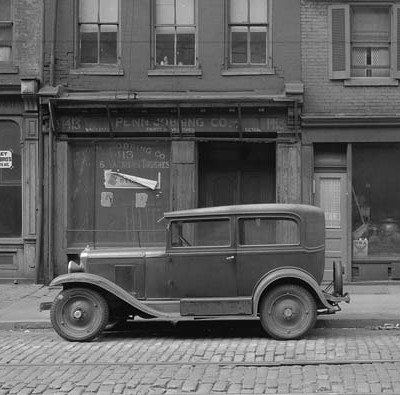
David Ziskind (1879-1954) immigrated to Pittsburgh from Degutki, Poland, in 1904, to join relatives of his mother living in the Hill District. For more than 30 years, he owned a grocery store and meat market in the Strip District, including a long stint at 1433 Penn Avenue. The business primarily served Polish and Russian immigrants working at a nearby American Steel & Wire Company mill, according to his son Jack Ziskind. Landladies would establish lines of credit on behalf of their boarders and reconcile each account on payday. Among Ziskind’s customers was John Kane, a Pennsylvania Railroad Company worker who later became a celebrated painter. Kane once offered the Ziskinds a painting to settle his overdue account, but they extended his credit instead. The painting, according to Jack Ziskind, is now in the Carnegie Museum of Art.
In 1910, David Ziskind married Rachel Chenkin (1889-1971), who had immigrated to Pittsburgh from Starodub, Russia, three years earlier and changed her surname to Jenkins. They lived above their store before moving to South Evaline Street in the East End about 1921. They had five children, Jack, Albert, Zelda, Samuel and Gerald. Their sons Jack, Samuel and Gerald served in the Armed Forces simultaneously during World War II. The Ziskinds hung a framed portrait of President Franklin Roosevelt in their front window as a show of support.
Jack Ziskind (1911-2011) graduated from Friendship Elementary School and Peabody High School. He managed a Gulf Refining Company service station while taking business classes at the University of Pittsburgh. After two years in school, he left to manage a Star Market in the Strip District. He later managed the independent Scharf’s Market in Garfield and spent several years working for the Kroger Grocery and Baking Company before getting a job with the Allegheny County Board of Assistance in 1938. During World War II, he was stationed in North Africa, Italy and southern France. After the war, he was put on special assignment with Scotland Yard as an officer in an Army Reserve Intelligence Unit before returning to Pittsburgh. He retired from the service as a colonel.
Albert Ziskind (1913-2004) was disqualified for military service for medical reasons. After working with Pittsburgh newspapers, he was employed by the state in various capacities, including as a placement counselor for the State Bureau of Rehabilitation.
Dr. Zelda Ziskind (1915-2009) was the valedictorian of her class at Peabody High School. She spent two years in a pre-medical program at the University of Pittsburgh before entering the Women’s Medical College of Pennsylvania in Philadelphia. She wanted to enlist during the war, but her family resisted. After an internship at Passavant Hospital, she became a general practitioner in East Liberty for many years, “delivering half the babies born in East Liberty,” as her brother Gerald told the Pittsburgh Post-Gazette in 2006.
After graduating from Pittsburgh schools, Samuel Ziskind (1918-) attended Allegheny College in Meadville, Pa., where he edited the Campus student newspaper. He paid for his tuition by operating a switchboard at a local hospital. He joined the Army immediately after finishing a journalism fellowship at Yale University. In the Army, he edited military publications in the United States and England. After being transferred to southern France, he worked with Yank and Stars and Stripes. He then served as the chief of the enlisted section of the United States Rest and Recreation Area, which provided short rehabilitation stays in commandeered hotels on the French Riviera for more than 900,000 combat troops during the war. After the war, Ziskind joined the staff of Army Information Digest. As managing editor, he instituted changes to the coverage and design of the publication, guiding its evolution into the present-day Soldiers Magazine. In 1961, he produced The Lesson and the Legacy, a history of the Civil War. He was inducted into the U.S. Army Public Affairs Hall of Fame in 2002.
Gerald Ziskind (1920-2019) attended the University of Pittsburgh. While there, he wrote a column for The Pitt News called “Common Sense” under the pen name “Senator” Ziskind, which he had picked up at Peabody High School due to his oratory skills. The Pittsburgh Press also regularly published his letters to the editor on matters of local and national politics. He was attending law school when he enlisted in the U.S. Army. He fought in the Battle of the Bulge and, toward the end of the war, became a military governor in Germany. Upon returning home, he completed his degree and practiced law in the city.